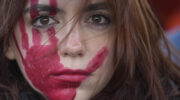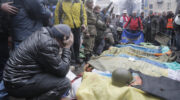‘Double discrimination’: In French soccer, being female and LGBTQ
| View caption Hide caption
Soccer matches that end in a brawl are relatively rare. But such offensive comments from coaches, players, and the public remain commonplace in soccer, for both women and men, in France and across Europe. Despite a new rule implemented over the summer by France’s Professional Football League (LFP) to halt matches over homophobic chants or signs – homophobia in French football abounds and being openly gay remains taboo.
Even if there are about 40 world-class international female players who are openly lesbian, no French professional players, male or female, have come out publicly. The continued discrimination that French women face in entering the world of professional soccer has made many hesitant to add another layer of potential prejudice, and the expectation to remain outwardly feminine – by both officials and fans – has forced many into silence.
While France passed a law to allow same sex marriage and adoption in 2013, the country remains conservative compared with its Western European neighbors when it comes to LGBTQ issues. A group called “Maires pour l’Enfance” claims more than 20,000 civil servants who are opposed to the 2013 law. Debate continues over allowing in vitro fertilization for lesbian couples, and there are few openly lesbian public personalities in French society. For the third year in a row, gay rights group SOS Homophobie has reported an increase in homophobic acts. Many experts say it’s no surprise that homosexuality in French soccer remains closeted.
“We’ve seen progress in terms of accepting homosexuality in French society but there is still a lot of discrimination,” says Quentin Leportier, co-founder of equal rights group Ex aequo and an expert on discrimination in sports. “Already, to see two women holding hands publicly is complicated in society, so to see that in sports is even more complicated.”
World Cup glow
Women’s soccer took the limelight this past summer when the FIFA Women’s World Cup was held in France. Since the championship, French clubs have seen an uptick in participation and commercial sponsors are investing more heavily in the sport.
But women’s soccer continues to struggle for equal rights. Women players earn 96% less than their male counterparts, according to a 2017 study by independent monitoring organization L’Observatoire des Inégalités. And women represent just 8% of the nearly 2.2 million people registered with the French Football Federation (FFF), which governs both professional and amateur leagues.
The fight to be seen as equals has hindered progress on talking about players’ homosexuality, observers say, as the athletes actively work to avoid double discrimination.
“Women players already withstand sexism in the sport so if on top of that, they say they’re gay – it’s one more opportunity for discrimination and there is an intersectionality that takes place,” says Mr. Leportier.
Some players may avoid bringing attention to their sexuality in order to keep corporate sponsors or for fear of violence, while many cite pressure to appear stereotypically feminine. But this, say some, is just veiled homophobia.
“In order to gain more spectators, more visibility for the sport, women players have had to appear more feminine, so that soccer isn’t a marker for being a lesbian,” says Julie Chrétien, a player for FC Paris Arc-en-Ciel. “But if we say that women’s soccer has to be compatible with femininity, homophobia is not far away.”
Femininity on the field
Catherine Louveau, a sociologist and professor emeritus at l’Université de Paris Sud who specializes in gender and discrimination in sports, says that French female professional football players have received an official directive on their appearance – with instructions to maintain stereotypically feminine attributes, like having long hair, wearing makeup and jewelry, or painting their nails. Some have gone out of their way to post photos of themselves with their male partners on social media in a show of heteronormativity.
“Sports have been constructed in a very binary way,” says Ms. Louveau, who was a pioneer in talking about feminism in sports in the 1970s. “So when you subvert that, by your clothing or by being gay, it becomes unbearable for some parts of society.”
Soccer’s potential “coming-out” moment has also been hindered by recent national debate over homophobia during games. France’s sports minister in April launched an appeal to stop games over homophobia, as is already done for racist incidents. Since the LFP enacted the rule over the summer, upward of 20 games have been temporarily halted.
But in September, the president of the FFF pitted himself against the government and the LFP by announcing that he would tell referees not to stop games over homophobic incidents. For many LGBTQ players, the sense that the FFF doesn’t support them has huge consequences.
“If the president of the FFF can say something like that, it legitimizes certain behaviors,” says Ms. Pieters. “How can we then explain to young players that they should or shouldn’t say certain things?”
French women’s soccer might have benefited from openly gay players taking the spotlight during the World Cup, notably U.S. star Megan Rapinoe, who said she would not visit the White House in the event of a U.S. win. But France’s quarter-final appearance in the tournament did not incite anyone to come out.
“We all know very well who is gay but there has been no movement on this front, it’s still too taboo,” says Veronica Noseda, co-founder of Les Dégommeuses, a Paris-based soccer club comprised primarily of lesbian and transgender members. “France is a very universalist society, united by the values of the republic. It’s difficult to declare your differences, which is why there are very few well-known people who have come out, across all domains,” says Ms. Noseda.
Teams as safe spaces
LGBTQ-friendly soccer teams have sprung up across France as a way to counteract homophobia in the sport. Teams like Les Dégommeuses and FC Paris Arc-en-Ciel are two of many clubs that provide a safe space for gay players. And last summer Paris hosted the 10th Gay Games, an international event held every four years to promote equality in sports.
Antoine Griezmann, France’s star male player, was criticized by some for supporting the LFP decision to stop matches over homophobia and posing for the cover of LGBTQ magazine Têtu. Some said he should stick to kicking the ball.
“Many people say that certain homophobic words used during games are just part of the culture, but we need to remember that they can be extremely hurtful,” says Frédérique Vidal, administrator for Fédération Sportive Gaie et Lesbienne and a soccer player since she was a child. “We shouldn’t have to justify ourselves. … We just want to play.”




